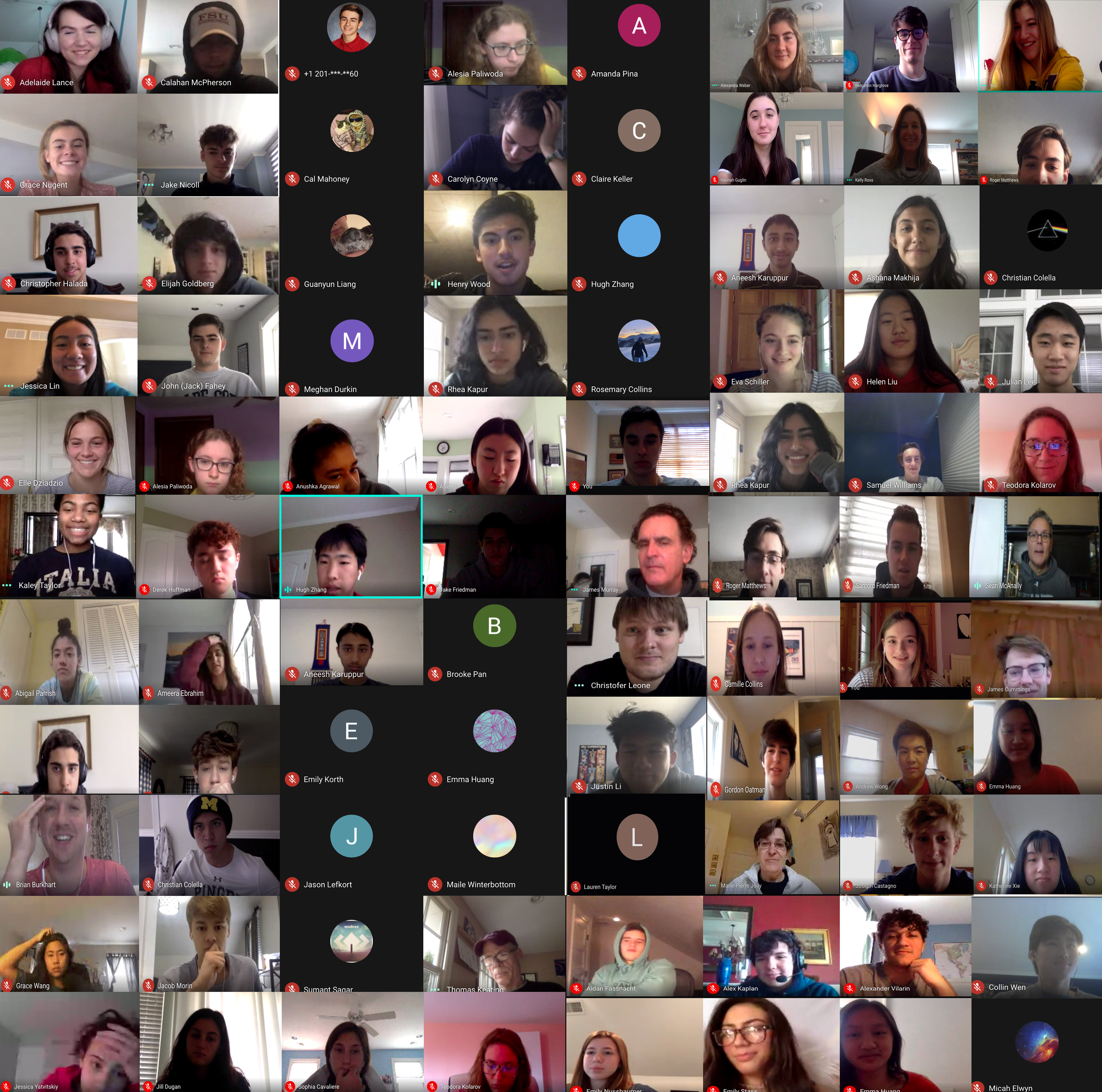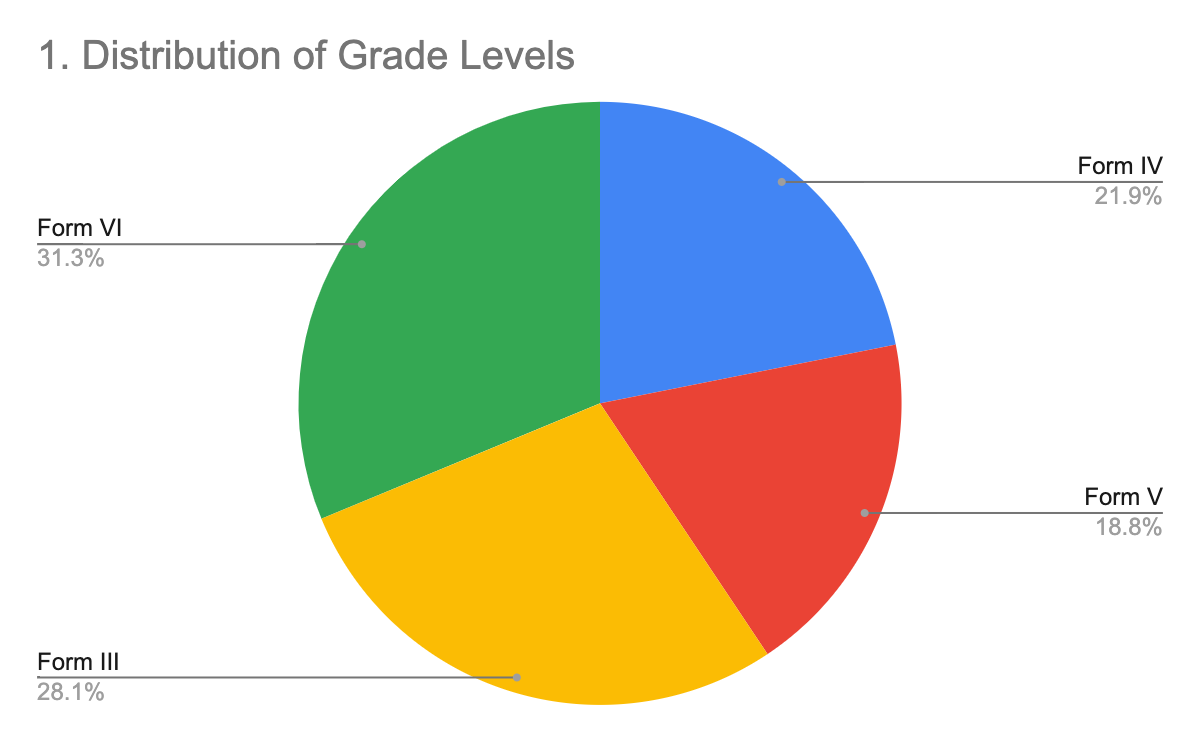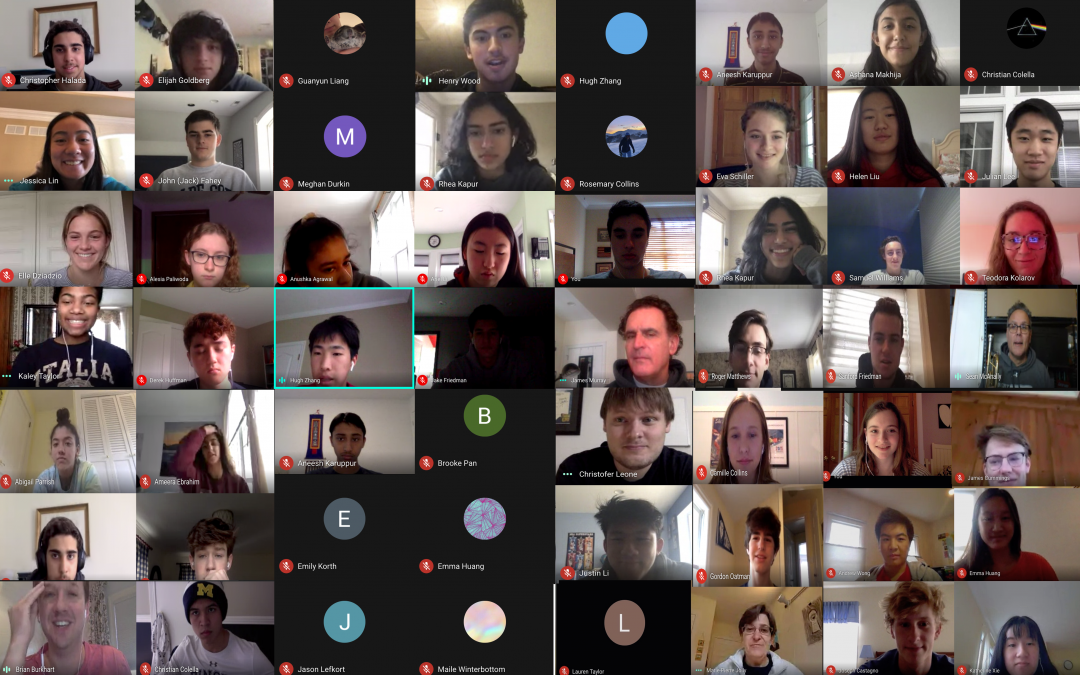
Apr 23, 2020 | COVID-19, Emily Shen, Front Page News, School News
Image by Andrew Wong (IV)
By Emily Shen (IV)
Since the conclusion of Spring Break, Pingry students and faculty members have adopted remote learning in order to follow the state-mandated social distancing guidelines. By now, they have finished their first two weeks online. Although this transition has not been easy, members of the Pingry community are working hard to resume the quest for knowledge as they try to find peace during this time of uncertainty.
According to feedback from some students, most of their classes run synchronously or by using a combination of synchronous and asynchronous sessions. Almost all of the teachers use Google Meet as the platform for “face-to-face” sessions or conversations, and most work is posted via Schoology or sent out through emails. Teachers make themselves available for help during designated time slots or during flexes and conference periods to make sure students can still seek extra help if they need to.
However, although the continuation of block schedules is supposed to help create structure, the switch to remote learning has not been an easy one for the students. Many have reported that remote learning is negatively affecting their productivity, and it often seems like there is less time for students to meet with their teachers for help. Because students and teachers are constantly interacting through their computer screens, some found that online school is more draining than typical school. Many students also report a significant increase in their workload, as well as a lack of motivation to finish it. Moreover, although teachers were guided to cut their 60-minutes periods to 45 minutes, students still spend hours in front of their computers between attending classes and school work.
Students are not alone in having to adjust to virtual classes. Many teachers also find themselves having to alter their usual way of teaching. “The biggest difference for me is that teaching is like acting or stand-up comedy. I respond to the energy of the group. When we are physically all together, I can see and feel so much more. I can tell when you are tired or sad or upset with somebody in the room. I can tell whether you understand or not, so I can adjust my response…Online, it all feels much stiffer.” said Upper School English teacher, Mrs. Grant.
For the last two weeks, teachers reported that they have gotten a little more used to the experience, but they continue to struggle with their lesson plans. “Lesson planning is very different, and it takes a lot longer. I find myself reaching out to other language teachers, exploring different sources,” said Mr. Benoit, World Languages Department Chair and Upper School French teacher, “The most complex part right now is figuring out what assessments will look like at the end of each unit or theme.” Mr. Grant, a chemistry teacher at Pingry, believes that “if learning isn’t fun, then it will be easily forgotten. We need to help students gain the skills of thinking and reasoning that they will use throughout their lives.”
When asked how they’ve adjusted to remote learning, teachers listed several examples of how they have had to adapt. “One thing I learned from my first class is that as a teacher, I hate the mute button for my students, and now I have a ‘no mute’ policy,” answered Mr. Grant. Ms. Thuzar, a computer science and math teacher at Pingry, said that she “spends more time planning and making sure that the remote learning experience for the classes is not too different from the actual in-person classes.” Although that is difficult to accomplish, Pingry students and teachers are all trying to find some peace and normalcy during this chaotic time.
Like their students, some teachers have also found remote learning to be more tiring than a typical school day. “For some reason, this is all so draining,” said Mrs. Grant when asked about her experience, “Instead of gaining energy from being with all of you, I get exhausted. I was talking with some colleagues Friday evening, and they all reported that they wanted to take a nap in between classes.” Many teachers and students end up sitting in front of the computer and barely getting up the whole day. “I feel like all the classes are all lumped together into this continuous-time span where I sit at my desk in front of my computers for hours,” Ms. Thuzar added, “For the days I teach 3 or 4 classes per day, I ended up staying in front of my computers from about 8 AM to 4 PM, excluding lunch.”
Even though the future is filled with uncertainty, spreading positivity and hope has kept us going. Mrs. Grant shared a small anecdote that cheered many of her students up: “On a positive note, since Mr. Grant and I have opposite schedules, there is non-stop teaching going on in my house right now, so my cats are soon going to be ready for college!” Similarly, Mr. Grant shared that “these are definitely strange times. I think that the most important thing that remote learning can try to achieve is our sense of community. We will get through this experience and remember these times for the rest of our lives. With this in mind, I hope we can make some good memories together.”
Please take care of yourselves and continue to spread love and positivity amongst your friends and family! Stay safe!
Apr 20, 2020 | COVID-19, School News
By Zara Jacobs (V)
In wake of the devastation of COVID-19, many people have felt a sudden urge to do something, anything to help the community heal. Even though making a thank-you video or completing a Color-A-Smile seems pointless next to the tragedies we face, “The smallest act of kindness is worth more than the grandest intention” (Oscar Wilde). The amount of time it takes to post on Instagram is the same amount of time it takes to fill out the form that sends notes of appreciation to the healthcare professionals at Morristown Memorial Hospital. Though we cannot provide a cure, there is no end to the ways we can support the people in our community.
The Community Service Council has started making Morning Meeting announcements that present volunteer opportunities, including sharing your appreciation, making sleeping mats out of plastic bags, and so many more. We urge you to at least look at the slides, if nothing else, to simply learn about what you can do to help. It can be really easy to feel helpless, especially in the context of community service. All we want to do is hug our neighbors and our friends and those who are not able to attend their loved ones’ funeral, but we can assure you is that even one thank you video will bring a smile to a doctor who has worked around the clock, putting their life at risk for the sake of the community. Calling your grandma or her friends will bring a smile to their face. When we are able to escape quarantine, we think it would be amazing if every student could come back to Pingry knowing they brought a smile to just one person’s face.
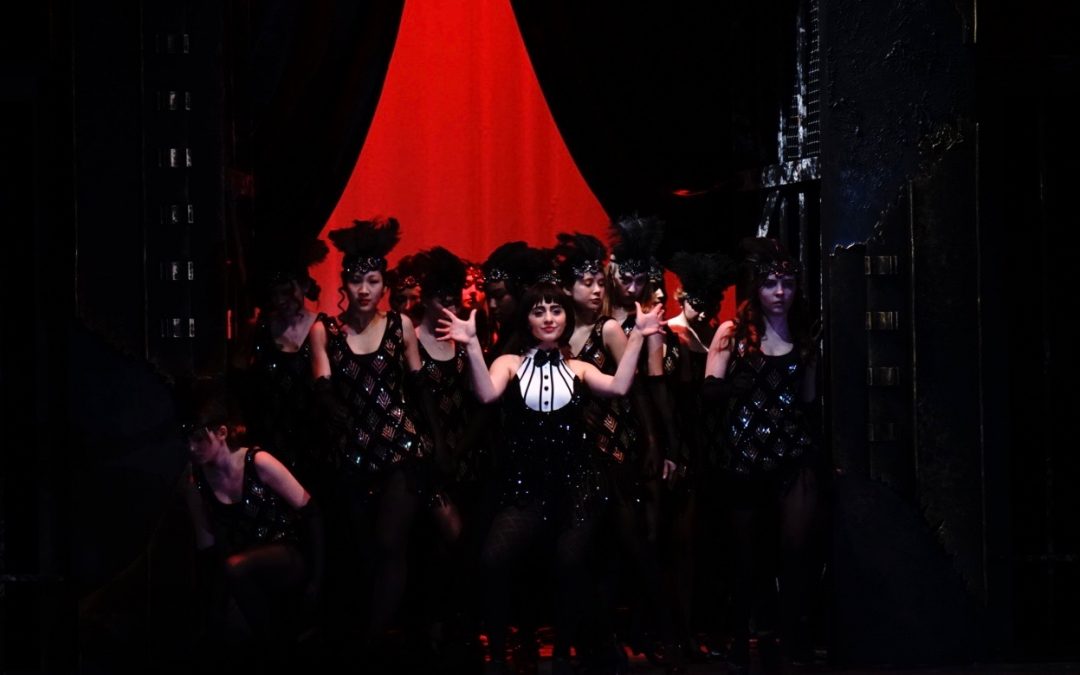
Apr 20, 2020 | Arts, School News
By Kyra Li (III)
This year, on February 20, 21, and 22, Pingry’s Drama and Music Departments, under the direction of Mr. Alan Van Antwerp, performed Chicago, the longest-running American musical in Broadway history. With its show-stopping music by John Kander and choreography by Bob Fosse, Chicago has won 6 Tony Awards, 2 Olivier Awards, and a Grammy. Chicago was written by Maurine Dallas Watkins, who was influenced by the true stories of Beulah Annan and Belva Gaertner, two women who were suspected of murdering their lovers. The musical follows two women, Roxie Hart and Velma Kelly, as they commit crimes and find their way to freedom.
The musical opens with the “Overture” and is directly followed by “All that Jazz.” In this scene, the vaudevillian, Velma Kelly (Nicole Gilbert ‘20), is shown shooting her lover. Moments later, the ambitious Roxie Hart (Nina Srikanth ‘20) is also shown shooting Fred Casely (Zach Burns ‘23), the man she is having an affair with. Roxie’s husband, Amos Hart (Alex Kaplan ‘21), initially takes the blame for Casley’s death. Though, when he discovers that Roxie had lied to him, he tells the police the truth, and Roxie is sent to prison. When Roxie talks to Velma and Matron “Mama” Morton (Ola Weber ‘20) in the Cook County Jail, Roxie realizes that she will need a lawyer in order to be set free. Thus, she finds the best lawyer in Chicago, Billy Flynn (Ore Shote ‘21), who also happens to be Velma’s lawyer. As the story progresses, the characters gradually unfold their true intentions and desires, as the attempt to convince the juries of their innocence. In the end, Roxie and Velma are both freed of their charges, and the show closes with a depiction of their duo Vaudeville act.
Throughout the performance this year, unlike many past shows, the pit was visible on stage and was even included in some scenes. Conducted by Dr. Andrew Moore, the pit consisted of students, teachers, and hired professionals. In the weeks leading up to the performances, the pit practiced weekly. The cast and pit also came together for a Sitzprobe, a rehearsal dedicated to integrating the singers with the pit. In addition to the cast and pit, the crew also played a vital part in creating the show. With the help of Mr. Joseph Napolitano and Ms. Emma Barakat, the students helped build the set and worked in the booth, where the lighting and sound was controlled. The costumes were also a major element in the production. Stage manager Julia Guagliardo (VI) said, “Finding costumes was really enjoyable. Mr. Napolitano and the costume team worked very hard to find costumes that fit with the time period and that worked well with our set.”
Overall, Chicago was an amazing experience for all of the cast, crew, and teachers involved. Nicole Gilbert, who played Velma, said, “Chicago was my favorite Pingry production. It was a hard show to be in and to direct because there are so many elements to it, but the cast and crew really pulled it off and made it a very rewarding experience.” The show also taught everyone involved many new skills. Guagliardo stated, “The musical taught me a plethora of skills that I will take with me. Working with such a large group of people was challenging at times, but overall showed me how powerful collaboration is. It was so wonderful to be given the opportunity to work hand in hand with both other students and teachers.”
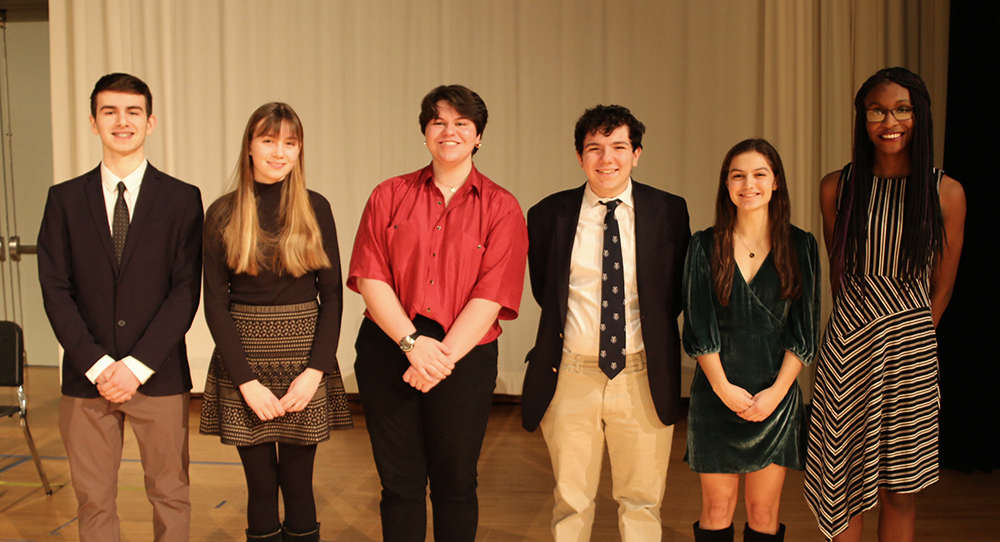
Apr 20, 2020 | School News
By Zoe Wang (IV)
On February 21, 2020, six finalists took part in the annual Lebow Oratorical Competition. The competition was created by classmates of Dr. Robert H. Lebow ‘58 in honor of his passion for public speaking. Dr. Lebow used public speaking to support the global need for healthcare reform while he traveled to developing countries to provide medical services with his wife, Gail. His legacy is celebrated to this day by members of the sophomore and junior class, who write and deliver 4 ½ to 6 ½ minute speeches for his namesake competition.
The preliminary round took place over two days, where 21 students competed for six spots in the final round. There were two rooms with two judges each, and the top three scores from each room advanced. The speeches, which ranged from persuasive to informative, were judged using a rubric that focused on the flow, organization, and delivery of the overall speech. This year’s finalists were Noah Bergam (V), Cal Mahoney (V), Alex Kaplan (V), Ajuné Richardson (V), Carolyn Coyne (V), and Martine Bigos (IV).
Bigos spoke first with her speech titled “Schlemiel, Schlimazel.” She juxtaposed herself with the character Garry from NBC’s Parks and Recreation. Garry is known as a klutz by his co-workers and is thought of as nothing more than the little mistakes he makes. Bigos looks back on her own experiences, acknowledging that she too has her moments. Nevertheless, she stressed the importance of not being “defined by your worst mistakes.”
The next speech was Bergam’s “Big Fish in the Pingry Pond,” which he began by discussing students’ lack of participation in September’s Global Climate Strikes and Pingry’s general taboo on politics and debate. He expressed his hope that Pingry students can embrace more timely and less universally agreeable political discussion, in the classroom, clubs, and ultimately, in the LeBow competition itself. Noah suggested that “debate isn’t about winning—it’s about learning . . . disagreement is tiresome and messy, but it’s necessary.”
Next, Mahoney delivered their speech entitled “Cancelling Cancelling.” They began by relaying a memory of their first minor fender-bender while on their way to school. Mahoney recognizes that “mistakes are inevitable when someone is new to something, but how you respond to them is up to you.” They explain that in today’s society even a small misunderstanding can lead to someone being “cancelled.” Closing the speech, Mahoney affirmed the idea that a person’s mistakes should be treated with kindness in order to help them learn.
Then, Kaplan described how drama became his passion in his speech “The Pursuit of Passion.” It all started in fifth grade when he signed up to act in the Lower School’s rendition of The Wizard of Oz. He emphasized that the older he gets, the harder it is to weave his passion into his schedule, as a result of society’s focus on “non-passions.” Ultimately, Kaplan affirmed that he can have the profession he wants, while also enjoying his passion.
Richardson’s (V) “The Color of Music,” which highlights her identity as an African-American through her changing taste in music, followed. She grew up listening to artists like John Legend and Ne-Yo. Though, as her music taste started drifting from her family’s roots, her friends and family started calling her “white,” which caused her to struggle with her identity. Now, she is back to listening to the music of her childhood and is proud to embrace her identity as a “young black woman.”
The final speech was Coyne’s “Tell Me About Yourself.” In her speech, she addressed the question “Who are you?” She explained that most people’s usual response includes quick facts about themselves instead of more revealing personal principles. Coyne emphasized the need for everyone, including herself, to be alone sometimes in order to take care of themselves and learn more about who they truly are.
Ultimately, Mahoney was declared the winner and Ajuné Richardson was made the runner-up. In the end, the Lebow Oratorical Competition is a great tradition at Pingry that continues to provide students not only the opportunity to present their talents in public speaking, but to also spread a message they’re passionate about.
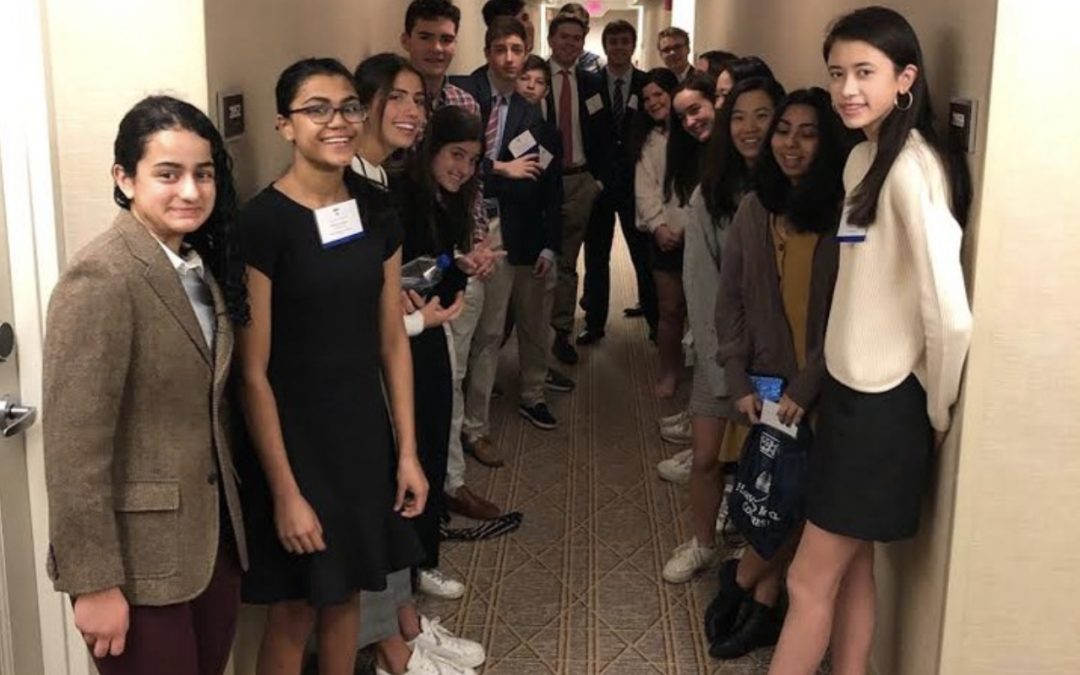
Apr 20, 2020 | Featured, Mirika Jambudi, School News, School Trips
By Mirika Jambudi (III)
On February 20th, Pingry students travelled to Boston, Massachusetts to participate in the Harvard Model Congress (HMC) held at the Boston Sheraton Hotel. HMC, the largest congressional simulation in the world, provides students the opportunity to learn what participating in the United States government is like.
Each student was assigned a current member of the U.S. House of Representatives or Senate to represent while at the conference. Before the event, students researched their roles, learning their delegate’s stance on various issues selected by the conference organizers.
During the conference, participants from around the country gathered to engage in lively debate, learn how to compromise, and simulate drafting legislation for the passage of bills. “I learned how to work with delegates from the other party to write bipartisan bills and make amends to certain sections of the bill to please both parties. Overall, it was a really great experience,” said Vared Shmuler (III). Sophomore Sarah Kloss (IV) gave several speeches as Billy Long, a Republican Congressman from Missouri, and was even able to present her bill during a full committee meeting.
On Friday, students had the opportunity to visit the Harvard University campus during their break. Afterwards, awards for outstanding performance at the event were announced. Ian Larson (VI) was awarded an honorary mention for best delegate in his committee, the National Economic Forum.
After an educating and engaging weekend, Pingry students are looking forward to returning to Harvard Model Congress next year!
Apr 20, 2020 | Fun, School News, Uncategorized
On February 3rd and 4th, sophomores and juniors participated in the preliminary round of the 2020 Robert H. Lebow Oratorical Competition. While the student body had the opportunity to watch the six finalists in the all-school assembly, they did not have the chance to hear all of the contestants perform their speeches and listen to their stories. All of the messages presented by the participants are important to the community, and as a result, excerpts from a few first-round speeches have been provided.
Brian Li: “The Neglect of Humanities in the 21st Century”
The humanities serve as the foundation for human civilization. They teach us how to think critically and creatively. They facilitate empathy and compassion. We communicate more clearly, understand cultural values, and are introduced to new perspectives through the humanities. Humanistic education has been the core of liberal arts since the ancient Greeks, challenging students through art, literature, and politics. The humanities bring clarity to the future by reflecting on the past. Perhaps most importantly, they allow us to explore and understand what it means to be human. We need, now more than ever, to be able to understand the humanity of others. And while STEM is undoubtedly beneficial for humankind, we cannot sustain the neglect of the humanities for much longer without suffering severe consequences. With revolutionary technology like AI and genetic engineering, the humanities are essential to ensure that we progress ethically and morally together.
Andrew Wong: “Where do you see yourself in 10 years?”
A question many of us in this room have heard in countless interviews, and yet it is a question that can reveal so much about ourselves. So, where will we be in 10 years? In 10 years, we will have found ourselves going through the entire college process and graduating from Pingry. We will go to and then graduate from college. We will have the rest of our lives splayed out in front of us, ready to grasp in our hands, as we enter the real world, ready to be the next generation of business people, engineers, doctors, lawyers, politicians, world leaders, and so much more. That answer seems pretty easy and straightforward, right? In reality, not so much.
Lauren Drzala: “An Uphill Battle”
As time went by, I was falling behind on work because I could not write at all, leaving me frustrated in school. In addition, my mental health was at an all-time low. I began to isolate myself, believing that no one could really understand how I was feeling. It was like I was falling and no one was there to catch me. On top of that, I was told I could not play my sport this winter, nor could I play the piano, an instrument that I have been playing since I was nine. I felt out of control and just had to watch the train wreck happen. I thought my friends had moved on so I tried to as well, but I just felt stuck. Left behind. I was in this mind set for a while, but it wasn’t until I realized that I could not give up on myself and settle for this empty feeling that my life started getting back on track. This triggered an uphill battle to try and climb my way out of the dark.
Aneesh Karuppur: “Straying from the Tune”
We are always told that “small steps will lead you to your goal” and “you won’t even know how much effort it really takes if you do it one step at a time.” But people forget that for this advice to work, you have to actually be looking at your feet and making sure that every step is in the right direction. Otherwise, you simply aren’t going to notice until you’re too far away from your goal to make a correction.
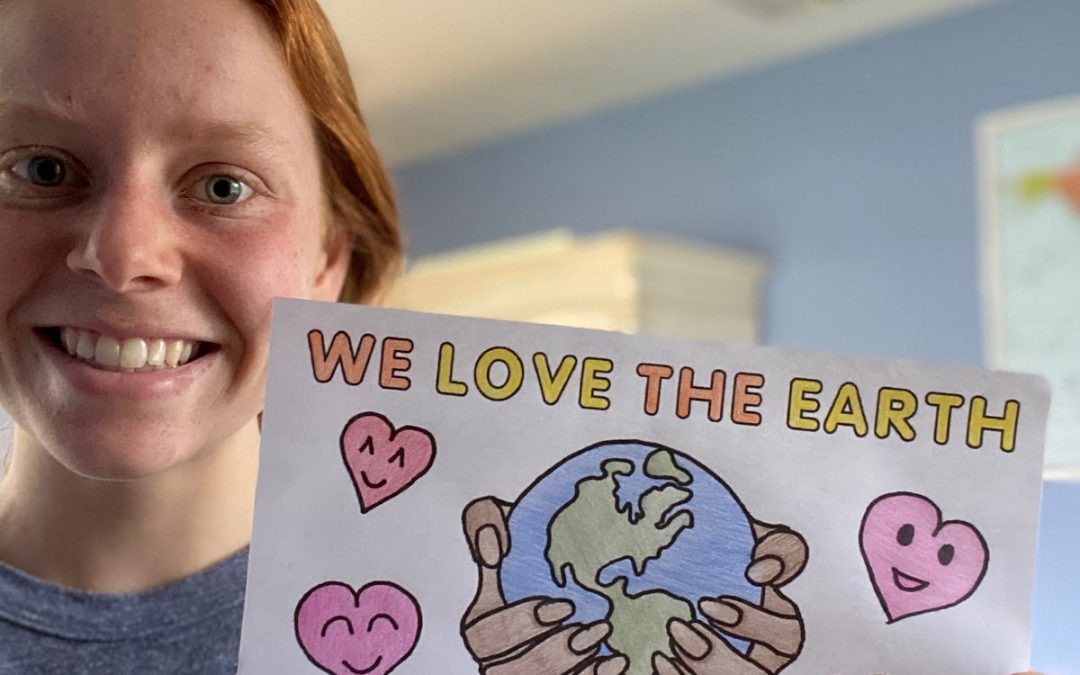
Apr 19, 2020 | COVID-19, School News, Sidebar News
In the wake of this devastating COVID-19 outbreak, a lot of people have felt a sudden urge to do something, anything, to help the community heal. Even though making a thank-you video or doing a color-a-smile seems pointless next to the tragedies we face, these initiatives make a difference. As Oscar Wilde put it, “The smallest act of kindness is worth more than the grandest intention.” The amount of time it takes to post on Instagram is the same amount of time it takes to fill out the form that sends notes of appreciation to the healthcare professionals at Morristown Memorial. Though we cannot provide a cure, there is no end to the ways we can support the people in our community. Pingry’s Community Service Council has started making Morning Meeting announcements that present volunteer opportunities from sharing your appreciation to making sleeping mats out of plastic bags. We urge you to at least look at the slides, if nothing else, to learn about what is available. It is easy to feel helpless in this socially distanced time, but we can assure you that even one thank you video will bring a smile to a doctor who has worked around the clock, or calling your grandparents every so often could truly brighten up their day. When we get out of this quarantine, I think it would be amazing if every student could come back to Pingry knowing they brought a smile to just one person’s face.
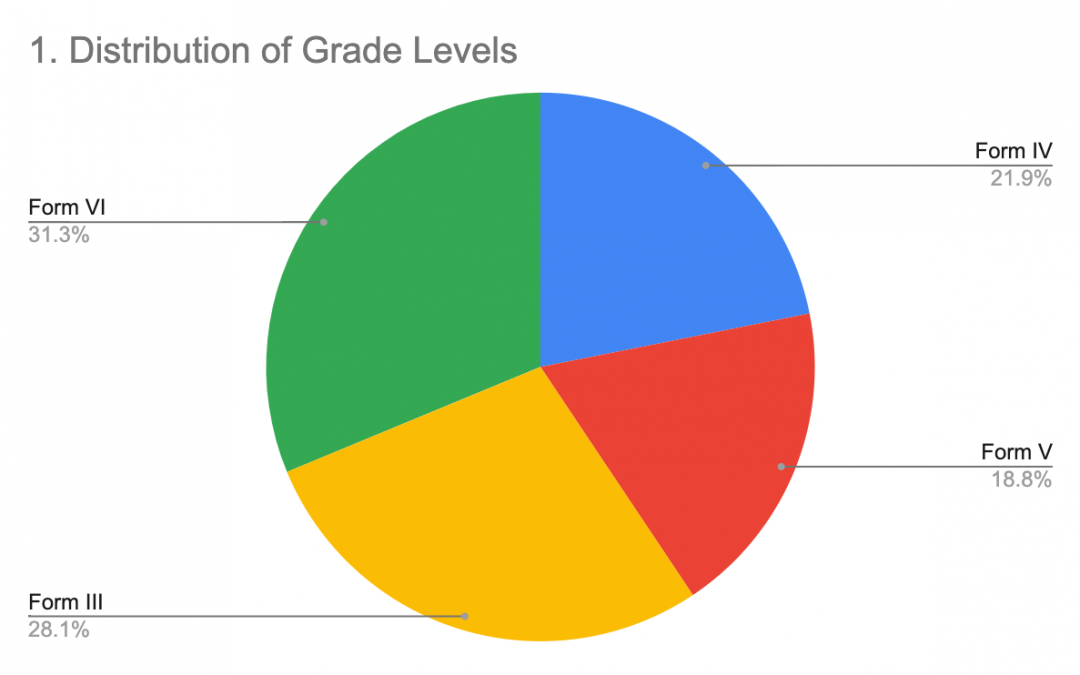
Apr 18, 2020 | Investigative, School News, Sidebar News
By Christine Guo (IV)
The Pingry Record recently sent out a survey to 75 Pingry Upper Schoolers about the school’s academic life. The purpose was to see what aspects of the school could be improved upon from a student’s perspective. Because it was anonymous, students were able to speak out on certain subjects that they may not have felt comfortable discussing before. The information gained from this survey benefits not just students, but the entire community by creating a better learning environment.
To get better results, it was crucial to poll a wide variety of Upper School students. Even though the juniors and seniors may have more experience in course selection, it was ultimately decided that every grade level should have a chance to voice their opinion. However, because the survey was only sent out to a small percentage of high schoolers, the data is not as accurate as it would have been if the entire school was polled. Moreover, only 32 people answered the survey, so the data cannot be considered a perfect representation of the student body. Luckily, a similar amount of people took the survey in each grade (Graph 1).
The majority of the survey questions were answered on a “strongly agree” to “strongly disagree” spectrum. Overall, there were some very interesting results. The majority of students agreed that Pingry offers enough art/music/drama courses (Graph 2a). In another statement, the majority strongly agreed that AP courses are important to them (Graph 2b). This is intriguing because it shows how relevant and worthwhile AP courses are to Pingry students. Most also felt neutral or strongly disagreed with the statement that Pingry should do away with academic awards (Graph 2c). However, in a later statement, the majority agreed that Pingry focuses too much on academic success (such as grades) (Graph 2d). Even though the results from Graph 2d and 2c may contradict each other, it is clear that many still see the academic awards as an integral part of the school. Lastly, more than half of the students disagreed that their teachers use Schoology effectively to send them updates (Graph 2e). This data shows how there is still a need for improvement with how technology is used in the classroom, which is especially relevant during remote learning.
The last few questions on the survey were free response. One question asked students whether there were any specific courses that they wished the school offered. A handful of students wanted more finance classes, especially those that could be applied to real-life circumstances (such as doing taxes). Other students wanted more philosophy and psychology courses. Another question asked if there were any extracurriculars that students believe the school should fund/pay more attention to. Some people wanted more attention towards debate, while others wanted funding for the music equipment and set design tools. However, it is important to also note that the majority of surveyed students did not offer a response to these questions.
After reviewing these results, one impressive takeaway is how content students are with the school’s academic program. That said, there are definitely ways to improve the student experience at Pingry.
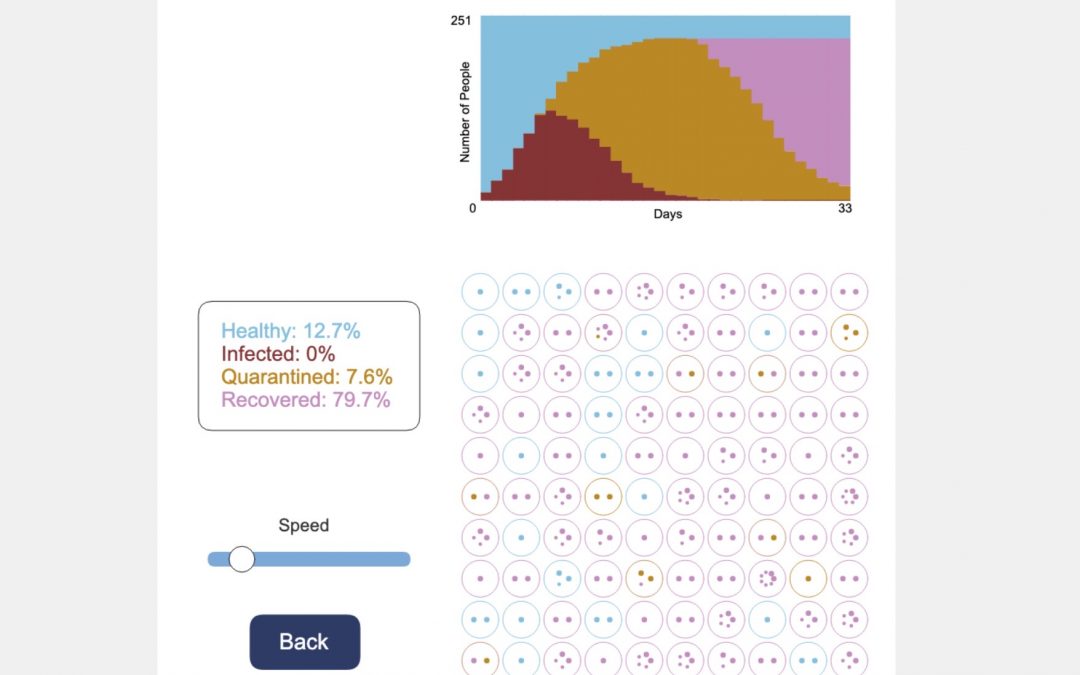
Apr 13, 2020 | COVID-19, School News, Sidebar News
By Julian Lee (V)
With statewide stay-at-home orders currently issued in at least 42 states, we should take into consideration the factors that could compromise the effectiveness of this quarantine. Inspired by the simulations created by the Washington Post and the YouTube channel 3Blue1Brown, I wanted to further investigate how human behavior––specifically, visiting friends––can impact the spread of COVID-19 under a quarantine environment.
I created a simulated environment of 100 households, where only interactions between family members and one-on-one visits with friends can cause infections. The user can change various parameters, such as the average days between visiting friends, and observe how changing these variables affect the spread of the virus. The simulation can be found here.
The simulation suggests that in the world of social distancing, the frequency of visiting friends has a greater impact on the spread of the virus than the size of a person’s social network (simulation results shown at the end of the article). Someone who visits the same friend every other day spreads the virus faster than someone who visits one friend every four days in a ten-person social network. Based on the simulation, reducing the number of friend visits during quarantine by a factor of two could have an effect comparable to halving the infection rate of the virus.
Below are my findings from the simulation (100 simulations were run for each setting):
- Doubling the average time between friend visits from 2 days to 4 days caused the virus’ average spread to decrease from 51% to 29% of the population.
- Halving the infection rate for both friend visits (from 20% to 10%) and family members (from 40% to 20%) resulted in a similar reduction in virus’ spread from 51% to 27% of the population.
- Decreasing the number of friends (i.e. the social network) from 10 to 1 caused the virus’ average spread to decrease from 54% to 40% of the population.
While someone might think it is completely benign to visit just “one” friend every other day, such behavior by an entire population can still result in an exponential growth of the virus. For example, if someone infects the one friend they are visiting during quarantine, that friend would then infect their entire family, and these family members would infect their own friends.
This simulation helps to quantitatively demonstrate an obvious yet powerful fact about social distancing: to ensure that our quarantine proves effective, it is essential that we work towards minimizing the frequency of visiting others.
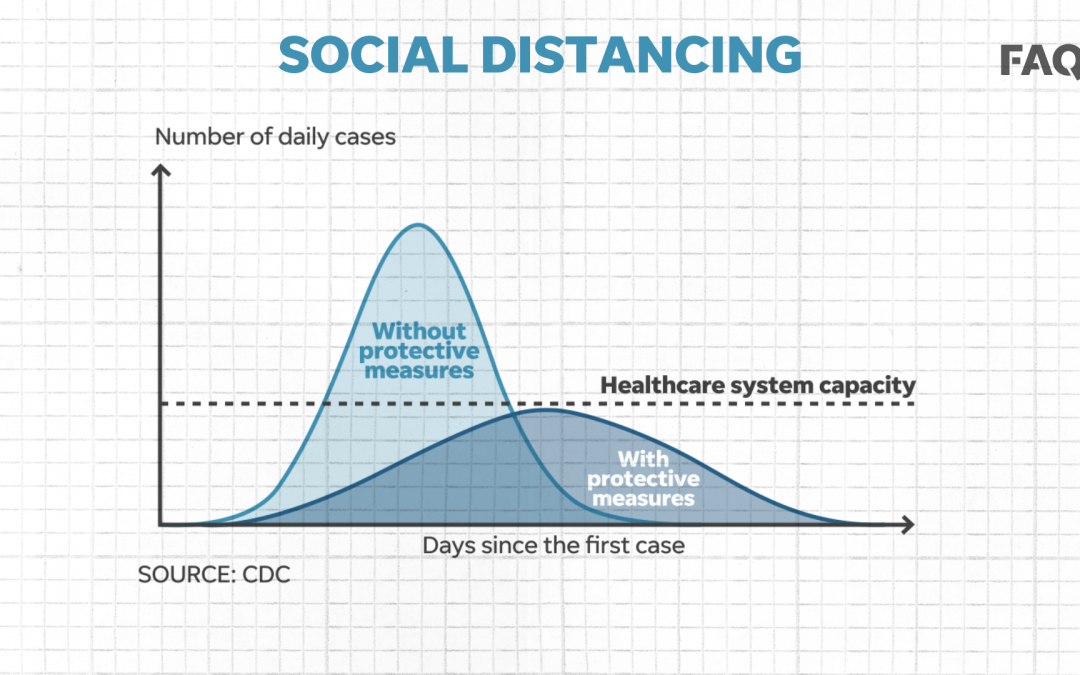
Apr 13, 2020 | COVID-19, Front Page News, Meghan Durkin, School News
By Meghan Durkin (V)
It’s been over two months since the United States confirmed its first coronavirus case in late January. Since then the landscape has changed drastically, as the virus has forced all non-essential businesses to shut down, kept most states under lockdown, and left most of the world at a standstill. This week, with cases in numerous states across America predicted to hit their peak, the healthcare system, its workers, and all others without the ability to stay home prepare for the hardest battle in the ongoing war against COVID-19.
During a news conference on April 4, New York Governor Andrew Cuomo called the apex “the battle of the mountain top,” and affirmed that New York and other highly-affected states, including New Jersey, “are not yet ready for the highpoint.” Our lack of preparation for such a high number of cases remains the greatest challenge of this apex. How can a healthcare system brace for a pandemic it never expected? How do hospitals continue to treat patients as their resources dwindle? As of April 11, the United States became the country with the greatest number of confirmed deaths, with over 1,000 being from New Jersey and about 7,000 being from New York. If the pressure on our healthcare system becomes too immense, those numbers will rise even faster.
Even when cases begin to decline, avoiding another outbreak is critical to curbing even greater disasters and preventing future quarantines. Many countries who seemed to have handed coronavirus an early and swift defeat faced a resurgence of cases in late March. For example, in Singapore, where cases had dropped by late February into March, a second wave of cases has forced the country to close all non-essential businesses and schools. The emergence of new cases in Singapore serves as an important warning to the United States: allowing people to return to school, work, or “normal” life too early may cause another outbreak of the virus. If the country doesn’t proceed with caution, there could be a second peak on its way.
Here’s the brighter side: a peak must be followed by a decline. At this point, a decline in cases can’t come soon enough. The Coronavirus is not only a medical problem, but also an economic disaster unlike any other. What had been a booming economy in the United States is now facing a major downturn. With many businesses forced to shut down, specifically those in the hospitality industry, companies have little choice but to lay off or furlough large parts of their workforce. In about three weeks, over 16 million Americans lost their jobs and the number continues to rise. For employees and employers across the country, the sooner the virus is controlled, the faster they can get back to work.
Ultimately, the onset of a peak in cases poses both problems and promise. The United States is far from being out of the woods, as evidenced by continued problems in countries, like Singapore, who are facing a second wave. Thus, the balance between caution and normalcy is becoming increasingly important to reduce deaths and keep the healthcare system afloat. Though, with the worst (hopefully) almost behind us, the U.S. and its people can slowly start to see the light at the end of the tunnel. If not released from possibly many more months under stay-at-home orders, then at least hope and reassurance that the worst is on its way out.

